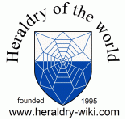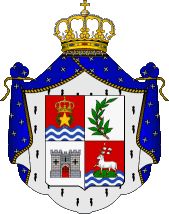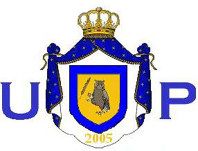Principality of Paulovia: Difference between revisions
Knorrepoes (talk | contribs) m (Text replace - "{|width="100%" style="color:brown;" |width="15%"|left |width="70%" align="center" | <font size=x-large> '''Heraldry of the World<br>The main resource for civic heraldry since 1996 with over 95.000 images''' </font> ) |
Knorrepoes (talk | contribs) m (Text replace - "{|width="100%" style="color:brown;" |width="15%"|left |width="70%" align="center" | <font size=x-large> '''Heraldry of the World<br>The main resource for civic heraldry since 1996 with over 95.000 images''' </font> ) |
||
| Line 1: | Line 1: | ||
{ | {{chief}} | ||
Revision as of 09:17, 2 March 2014
| Heraldry of the World The main resource for civic heraldry since 1996 with 295,337 images |
A micronation or virtual micro-state which is a historical, political and social simulation. Paulovia was formally established by HRH Prince Paul I on 31 July 1998 and made its internet debut as a virtual micronation on 27 July, 2005.
Although created for entertainment Paulovia has a serious side, supporting and promoting environmental, educational and charitable issues and associated campaigns through the Embassy and its consulates worldwide.
Paulovia does not claim any territory.
National or royal arms
The Royal Arms of the Munro-Smith dynasty was adopted as the State Arms of the re-established Principality of Paulovia on 31 July 2005.
The first quarter shows a golden star of unity surmounted by the crown of Paulovia on the sea representing the islands that comprise Paulovia today. The second quarter shows an olive branch with fruit representing Paulovian agrarian origins and peace and prosperity. The third quarter shows the ancient castle of Volturno in Italy, and the town of St.Paulo, original seat of royal government. The fourth quarter shows an Agnus Dei (Paschal Lamb) with St.George flag representing the historic links with the Greek Orthodox Church and the United Kingdom, over the sea representing the historical and lost lands of Paulovia.
The whole is surmounted by a Greek style crown symbolising the royal Anglo-Italo-Greco connections of the Munro-Smith dynasty.
University of Paulovia
The arms show an owl as the symbol of wisdom and the Quill Pen symbolic of academic study and creative acts.
Collector's Items
Literature: All information from http://www.paulovia.org


